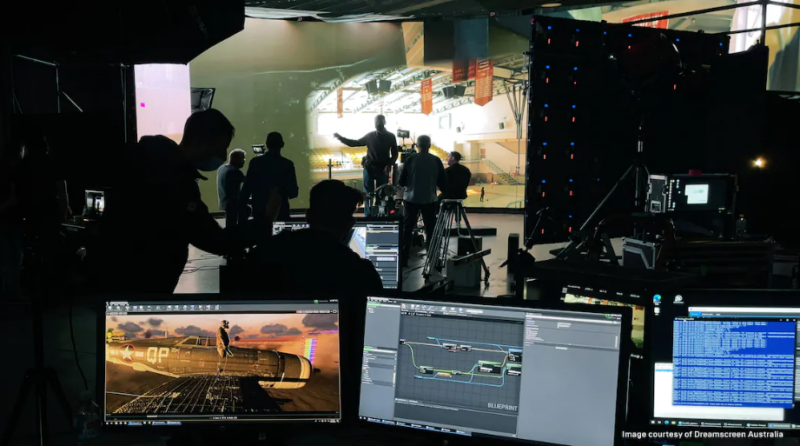AI: But Seriously, Folks…
 OK, for the last two months I have taken a very tongue-in-cheek look at the idea of artificial intelligence and robotics in the AV industry. I got a number of interesting emails from that column, from a criticism of my “union dues” joke to a number of serious thoughts about what A.I. would do to the industry. There were also some that were impossible to classify. The AVIXA Membership Department wanted to know what pronoun to use for the Techinator, and where to send all its InfoComm invitations. Gary Kayye was worried about whether the Techinator would wear t-shirts, and if so, what size?
OK, for the last two months I have taken a very tongue-in-cheek look at the idea of artificial intelligence and robotics in the AV industry. I got a number of interesting emails from that column, from a criticism of my “union dues” joke to a number of serious thoughts about what A.I. would do to the industry. There were also some that were impossible to classify. The AVIXA Membership Department wanted to know what pronoun to use for the Techinator, and where to send all its InfoComm invitations. Gary Kayye was worried about whether the Techinator would wear t-shirts, and if so, what size?
But, seriously, folks, AI is going to have a massive effect on our industry, because it is going to have a massive (and, as yet, unpredictable) effect on every industry. And I realized that to leave off after my last article might leave the impression that I was making fun of AI.
I was not. Artificial intelligence presents more possibilities than we can possibly foresee, to fundamentally change our lives — which makes it one of the most powerful, and most dangerous, technologies the human race has ever experimented with.
So let’s look at the advantages an artificial intelligence will bring to our business. Well, to start with, AI has the ability to take in and analyze vast amounts of data at unbelievable speeds from a huge number of sources. It could then process that data at Incredible rates, allowing it to compare huge amounts of data for relationships that may never have been thought about before, simply because an electronic intelligence can consider more factors at once.
Now, I can hear several of you out there saying, “But, Joel, we have been using computers to analyze vast amounts of data for decades.” That’s true. But the difference here is the ability of an artificial intelligence to determine its own lines of inquiry and its own additional research. With most current digital systems, computers do the analysis and comparisons we instruct them to. The fundamental idea behind artificially intelligent systems is not that they calculate, but that they think.
And before we even get to the world of the android technician I called “Techinator,” a world in which AI is self-propelled, we in the AV industry have some immediate, serious uses for artificially intelligent analysis:
1. Inventory and asset allocation
I once ran an AV rental company with 14 offices coast to coast across Canada. Our rental inventory was all considered “national,” and allocated by business requirements. This was a real art form, with our branch managers each producing business estimates for the year, based on local businesses, weather, trends and events, which were then juggled by our corporate staff in Toronto to produce quarterly plans to allocate inventory to the branches. Because distances and shipping costs were so high, this process could determine a branch’s profitability by eliminating (or causing) cross-rental. But this process was never 100 percent, due to fluctuations in everything from the weather to local economies. The ability to consider more factors, faster, using AI could change this kind of process completely.
1. Pricing and profitability analysis
For the same reasons, the analysis of pricing is always mysterious, and every owner I know spends time at this dartboard. If I raise the price on “x,” will it result in fewer rentals? If I lower the price, will increased rentals produce higher profitability or will it just wear out the inventory and raise delivery costs? Having to integrate this kind of question with economic, technological and business trends is once again something that can benefit (quickly) from the use of AI.
3. Business and systems flow analysis
Probably the greatest “sacred cow” in most companies are our business processes. How an order is handled, how inventory is used and how the paperwork flow works are all areas where profitability (and success itself) can be determined. But, often, we don’t see the forest for the trees. AI could help here, too, causing us to come up with innovative practices we might not have thought of previously.
We have, for some time, used computerized data analysis, but AI is more than that. It will become a participant in meetings and conversations. Those of us who grew up with computers have a really hard time grasping this, because we have spent our careers chuckling at the client’s notion that their computer had some kind of personality, anthropomorphizing them with phrases like “it doesn’t want to… (whatever).” Computers were just machines, had no feelings and if they didn’t do something, it was almost always an issue we abbreviated on tech support forms as PEBCAK, or “Problem Exists Between Chair and Keyboard.”
But I have been privileged to see the AI meeting experiments of a local major computer company, which does a lot of work on AI products for business. And the clearest way I can illustrate the differences between computerized analysis and AI comes, of course, from Star Trek. In the early series, the computer was something that the crew asked for information, by saying “Computer…” and then asking a question. The computer then answered the question, concisely. You had to ask the right question in the right way to get the answer you were looking for.
Fast-forward 30 years into another generation of the show, and “Mr. Data” (played by Brent Spiner) is sitting at the conference table, a full participant who asks his own questions and gives analysis. This is AI — a personality, equipped with vast amounts of data, it can process at incredible speeds. And yet, because an artificial intelligence can “think,” it can also produce unexpected results, like naming its cat “Spot.”
And this is why I believe we, in our little corner of the industry, will be among the first to take advantage of the capabilities of AI — our problems are complex and are often addressed intuitively.
And we may already have a cat named Spot.





